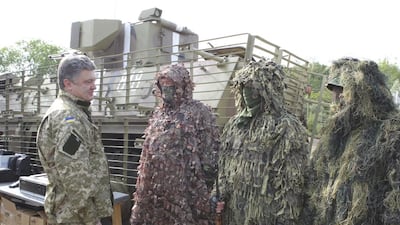KIEV // Ukraine’s president Petro Poroshenko ordered his forces to cease fire on Friday and halt military operations for seven days against pro-Russia separatists in the country’s east.
It was the first step in what he hopes is a concrete plan to end the conflict that has cost more than 350 lives.
Mr Poroshenko, speaking during his first trip as president to the troubled east, said troops would still return fire if attacked.
“The forces of the anti-terrorist operation will halt military action starting today and through June 27,” he was cited as saying by the interior ministry.
“Combat action will only be of retaliatory character if rebels attack our forces,” he added.
He made announcement while speaking to residents in the town of Sviatohirsk in the Donetsk region. Refugees from the rebel-held town of Slovyansk where some of the worst fighting has taken place were also at the meeting.
Separatists in the Donetsk and Luhansk regions have declared independence from his government in Kiev. Rebel leaders have dismissed the plan and it remains to be seen to what extent they would comply.
Mr Poroshenko has said a short ceasefire will give separatists time to lay down their arms and leave the country. Other steps include joint security patrols, new local and parliamentary elections, steps to protect language rights of the many Russian speakers in the area, and a jobs programme.
Mr Poroshenko discussed the details of his peace plan on the phone with Russian president Vladimir Putin on Thursday, and his office said he emphasised the need for introducing effective border controls and quickly releasing hostages seized by the rebels.
Earlier in on Friday, seven Ukrainian troops were reported killed in overnight fighting as clashes between government forces and pro-Russia rebels flared ahead of the ceasefire.
Separatists were operating tanks in the region, a particular sore point for Ukraine, which accuses Russia of letting the vehicles and other heavy weaponry cross the border.
Mr Putin has voiced concern about the Ukrainian military operation against the rebels but has resisted both the rebels’ pleas to join Russia and repeated calls from Russian nationalists for him to send troops into Ukraine. Nato reported Thursday, however, that Russia was resuming a military build-up at the Ukrainian border.
Mr Putin’s spokesman, Dmitry Peskov, said Russian officials were surprised at western expressions of concern over the renewed troop buildup, saying it was merely a previously announced measure to tighten border controls.
“This is not a matter of some sort of concentration of forces, but of the strengthening of border controls of the Russian Federation,” Mr Peskov was quoted as saying by the Itar-Tass news agency.
Separately, Mr Putin’s foreign policy aide, Yuri Ushakov, said the Russian president was committed to dialogue on Ukraine and planned to speak by phone with the US president Barack Obama in the coming days.
Mr Ushakov said Mr Putin would meet the chairman of the Organisation for Security and Cooperation in Europe during a visit to Austria next week to discuss Mr Poroshenko’s peace plan.
Meanwhile, the US issued new sanctions on riday against seven Ukraine separatists, including self-proclaimed rebel mayors, governors and commanders in chief of cities under siege, for refusing to cede to the central government in Kiev.
The penalties freeze any assets that the separatists have in the United States, and prohibit any American firms or businesses from dealing with them.
* Associated Press

